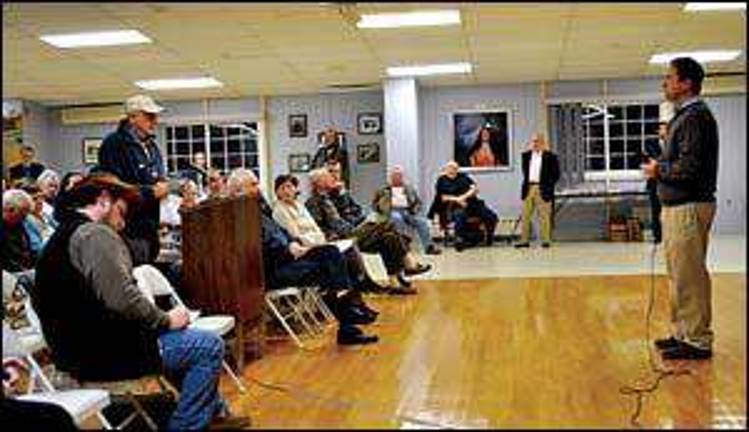Carney takes on issues at town hall

Health care, stimulus, illegal aliens & powerlines dominate questions at Delaware session, By Anya Tikka DINGMANS FERRY Representative Christopher Carney’s town hall meeting on Nov. 23 at the Delaware Township Municipal Hall drew about 70 people, and as expected, questions about the economy and health care dominated. Other issues that came up were immigration, and threats to the National Parks by the proposed power lines. “Why is government continuing to import foreign workers to this country, and does nothing to stop corporations from exporting jobs overseas?” asked one frustrated man. He was worried that his grandchildren would have no jobs. Carney said it is a complicated issue, and that he was working on it, adding that those whom the government lets in have specialized skills. “We’re part of the global economy, and also a nation of immigrants,” said Carney. In reply to the many questions about the new health care bill, Carney re-iterated that he voted for the bill because last minute amendments, such as including mandatory maternity leave, and no funding for abortions were added. Also more provisions to rural areas such as Pike’s 10th District were granted, namely $100,000 toward building a medical college in Scranton. Unless more general practitioners graduate, there’s going to be a shortage of doctors in future. Pike County is also going to get a new facility for children’s medical problems, thanks to a $150,000 grant. The congressman emphasized that getting the bill enacted is still a long way off. “It’s a long process.” The bill has to pass the Senate, which has its own version, and then it has to go to the committee where the differences between Democrats and Republicans will finally be ironed out. “Any of those processes could kill the bill,” added Carney. In response to a suggestion from the floor to “put more money into Medicare for those who need it, and leave us others alone”, Carney said some such version may be what we end up with. The audience burst into spontaneous applause when a man who said he’s been fortunate enough to have good health insurance all his life, said that “I don’t mind paying extra tax for the widows, children and the disadvantaged.” Carney stated that he doesn’t care which version of the bill passes, as long as it includes pre-existing conditions, has cost reductions, and transparency. He said that he voted against the Wall Street Bailout because it didn’t include enough oversight over those people who got us into the mess in the first place, and it’s penalizing all of us. He said the community banks are punished, and not the culprits in Wall Street. According to Carney, the stimulus, American Recovery and Reinvestment Act (ARRA), is working, because if something had not been done, we would now be in even worse recession than the Great Depression. He added that we’re about one third on the way of getting the stimulus money out into the economy, because there simply aren’t enough personnel to get everything done straight away, so it has to be done in phases. In his view the stimulus money is slowly finding its way to the local economy, and 2,500 jobs were added in the district, which includes not only Pike County, but also Susquehanna, Wyoming, and Bradford/Tioga counties. He also cited the new housing data that came out this week, showing a promising upward trend. He also reminded those present that the largest tax cut in US history was provided by the stimulus package, an often overlooked fact. Asked about illegal immigration, Carney said he’s on the Homeland Security Committee and goes to the border frequently, and said “We are in the process of building a wall, but they dig under it, and even use lightweight aircraft to drop off drugs over the border. There’s so much money in drug trafficking that it’s worth it to people to try it.” The enforcement of immigration laws is difficult because it’s grossly underfunded, he said. A “volunteer” asked about the proposed power lines that cut straight through the Water Gap’s national recreation area, citing the numerous adverse situations arising from it. Carney said that visitors to the scenic natural parks were a main source of revenue to the region and this resource should not be threatened by spoiling the Natural Parks. Carney said that his office had sent a letter to PSE, which seemed to want to take the “shortest path of greatest resistance”, instead of going around the park perimeter. The issue is tied to national Smart Grid’ planning, because the current transmission lines lose about 50% of the power generated, a national hot button issue.